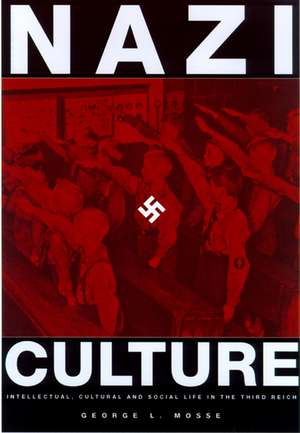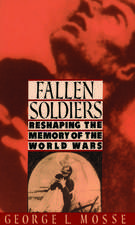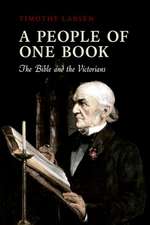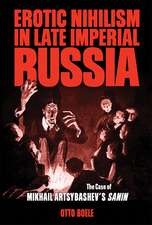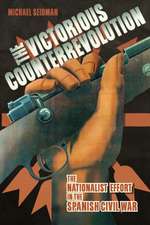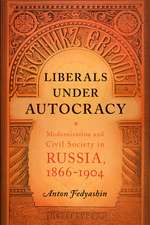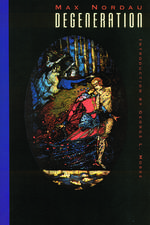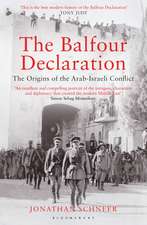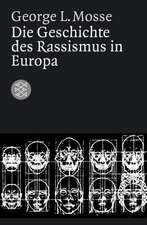Nazi Culture: Intellectual, Cultural, and Social Life in the Third Reich: George L. Mosse Series in the History of European Culture, Sexuality, and Ideas
Autor George L. Mosseen Limba Engleză Paperback – 9 oct 2003
Professor Mosse’s extensive analysis of Nazi culture—groundbreaking upon its original publication in 1966—is now offered to readers of a new generation. Selections from newspapers, novellas, plays, and diaries as well as the public pronouncements of Nazi leaders, churchmen, and professors describe National Socialism in practice and explore what it meant for the average German.
By recapturing the texture of culture and thought under the Third Reich, Mosse’s work still resonates today—as a document of everyday life in one of history’s darkest eras and as a living memory that reminds us never to forget.
Din seria George L. Mosse Series in the History of European Culture, Sexuality, and Ideas
-
 Preț: 119.08 lei
Preț: 119.08 lei -
 Preț: 166.01 lei
Preț: 166.01 lei -
 Preț: 338.36 lei
Preț: 338.36 lei -
 Preț: 144.97 lei
Preț: 144.97 lei -
 Preț: 143.79 lei
Preț: 143.79 lei - 19%
 Preț: 433.43 lei
Preț: 433.43 lei - 19%
 Preț: 437.17 lei
Preț: 437.17 lei -
 Preț: 297.44 lei
Preț: 297.44 lei -
 Preț: 282.91 lei
Preț: 282.91 lei -
 Preț: 154.26 lei
Preț: 154.26 lei -
 Preț: 246.19 lei
Preț: 246.19 lei -
 Preț: 231.53 lei
Preț: 231.53 lei -
 Preț: 250.82 lei
Preț: 250.82 lei -
 Preț: 246.19 lei
Preț: 246.19 lei -
 Preț: 306.34 lei
Preț: 306.34 lei -
 Preț: 305.90 lei
Preț: 305.90 lei -
 Preț: 131.04 lei
Preț: 131.04 lei -
 Preț: 279.45 lei
Preț: 279.45 lei -
 Preț: 181.22 lei
Preț: 181.22 lei -
 Preț: 189.96 lei
Preț: 189.96 lei -
 Preț: 251.23 lei
Preț: 251.23 lei -
 Preț: 188.60 lei
Preț: 188.60 lei -
 Preț: 315.95 lei
Preț: 315.95 lei - 23%
 Preț: 475.36 lei
Preț: 475.36 lei -
 Preț: 314.03 lei
Preț: 314.03 lei - 23%
 Preț: 482.44 lei
Preț: 482.44 lei - 8%
 Preț: 462.20 lei
Preț: 462.20 lei - 23%
 Preț: 482.60 lei
Preț: 482.60 lei -

Preț: 264.90 lei
Nou
Puncte Express: 397
Preț estimativ în valută:
50.69€ • 55.05$ • 42.58£
50.69€ • 55.05$ • 42.58£
Carte tipărită la comandă
Livrare economică 22 aprilie-06 mai
Preluare comenzi: 021 569.72.76
Specificații
ISBN-13: 9780299193041
ISBN-10: 0299193047
Pagini: 456
Dimensiuni: 140 x 203 x 30 mm
Greutate: 0.51 kg
Ediția:1
Editura: University of Wisconsin Press
Colecția University of Wisconsin Press
Seria George L. Mosse Series in the History of European Culture, Sexuality, and Ideas
ISBN-10: 0299193047
Pagini: 456
Dimensiuni: 140 x 203 x 30 mm
Greutate: 0.51 kg
Ediția:1
Editura: University of Wisconsin Press
Colecția University of Wisconsin Press
Seria George L. Mosse Series in the History of European Culture, Sexuality, and Ideas
Recenzii
"For the sanity of the human race it is essential that the record of Hitler’s Germany should remain alive and be retold again and again as a warning for the future. Professor Mosse’s book helps keep the record alive."—Saturday Review
"A magnificently edited collection."—Chicago Tribune
"A full picture of the scope and methods of the anti-cultural vandalism of the Nazis."—Christian Science Monitor
"A magnificently edited collection."—Chicago Tribune
"A full picture of the scope and methods of the anti-cultural vandalism of the Nazis."—Christian Science Monitor
Notă biografică
George L. Mosse (1919-1999) was the John C. Bascom Professor of European History and the Weinstein-Bascom Professor of Jewish Studies at the University of Wisconsin–Madison. He has long been recognized as one of the most creative and innovative historians of modern Europe during the second half of the nineteenth century. His research ranged from the Protestant Reformation and the seventeenth century to the political, social and cultural history of the nineteenth and twentieth centuries. Mosse revolutionized the study of Nazism and facism, and opened new dimensions in such diverse fields as nationalism, racism, historical memory and symbolism, the commemoration of mass death, German-Jewish history, and the history of sexuality and the body. No other Europeanist historian of the later twentieth century exhibited so broad a range of research and analysis.
Descriere
What was life like under the Third Reich? What went on between parents and children? What were the prevailing attitudes about sex, morality, religion? How did workers perceive the effects of the New Order in the workplace? What were the cultural currents—in art, music, science, education, drama, and on the radio?
Professor Mosse’s extensive analysis of Nazi culture—groundbreaking upon its original publication in 1966—is now offered to readers of a new generation. Selections from newspapers, novellas, plays, and diaries as well as the public pronouncements of Nazi leaders, churchmen, and professors describe National Socialism in practice and explore what it meant for the average German.
By recapturing the texture of culture and thought under the Third Reich, Mosse’s work still resonates today—as a document of everyday life in one of history’s darkest eras and as a living memory that reminds us never to forget.
Professor Mosse’s extensive analysis of Nazi culture—groundbreaking upon its original publication in 1966—is now offered to readers of a new generation. Selections from newspapers, novellas, plays, and diaries as well as the public pronouncements of Nazi leaders, churchmen, and professors describe National Socialism in practice and explore what it meant for the average German.
By recapturing the texture of culture and thought under the Third Reich, Mosse’s work still resonates today—as a document of everyday life in one of history’s darkest eras and as a living memory that reminds us never to forget.
